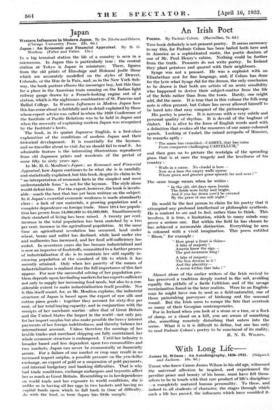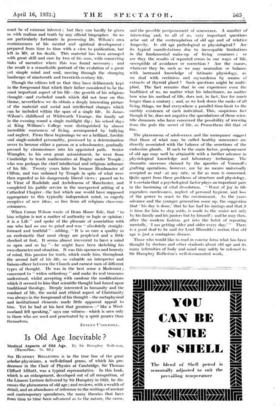With Long Life—
James M. Wilson : An Autobiography, 1836-1931. (Sidgwick and Jackson. 10s. 6d.)
THOSE who knew Canon James Wilson in his old age, witnessed the universal affection he inspired, and experienced the peculiar peace and beauty of his home, must have felt them- selves to be in touch with that rare product of life's disciplines —a completely matured human personality. To these, and indeed to. all students of character, the stages through which such a life has passed, the influences which have moulded it, must be of extreme interest ; but they can hardly be given us with realism and truth by any official biographer. So we are particularly fortunate in possessing Dr. Wilson's own reminiscences of his mental and spiritual development ; prepared from time to time with a view to publication, but left in MS. at his death. This material has been arranged with great skill and care by two of his sons, with connecting links of narrative where this was found necessary ; and the result-is a remarkable portrait of the evolution of a great yet simple mind and soul, moving through the changing landscape of nineteenth and twentieth-century life.
Though the editors tell us that they have deliberately kept in the foreground that which their father considered to be the most important aspect of his life—the growth of his religious thought—and excluded much which did not bear on this heme, nevertheless we do obtain a deeply interesting picture of the material and social and intellectual changes which can be included within the span of a single life. In James Wilson's childhood at Whitworth Vicarage, the family sat in the evening round a single rushlight dip ; his school days at . King William's College were distinguished by almost incredible coarseness of living, accompanied by bullying and neglect. From these beginnings we see a brilliant, forcible and single-minded personality, possessed by a determination never to become either a parson or a schoolmaster, gradually pressed by circumstance into his appointed path. Senior Wrangler, to his own great astonishment, he went from Cambridge to teach mathematics at Rugby under Temple ; who was perhaps the chief intellectual and religious influence of his life. Twenty years later he became Headmaster of Clifton, and was ordained by Temple in spite of what were then regarded as his dangerously liberal views ; passed on to be Vicar of Rochdale and Archdeacon of Manchester, and completed his public service in the unexpected setting of a Cathedral Chapter—the last which one would have supposed appropriate to this typically independent mind, so eagerly receptive of new ideas, so free from all religious class-con- sciousness.
When Canon Wilson wrote of Dean Moore Ede, that "to bins religion is not a matter of authority or logic or opinion ; it is a Life' and spoke of the pleasure of association with one Who had no axe to grind and was "absolutely straight- forward and truthful "—adding, "It is so rare a quality in an ecclesiastic that most clergy arc perplexed and a little shocked at first. It seems almost irreverent to have a mind so open and so lay "—he might have been sketching his own character and situation. It was this openness and honesty of mind, this passion for truth,- which made him, throughout the second half of his life, so valuable an interpreter and liaison-officer between the Church and earnest men of different types of thought. He was in the best sense a Modernist : concerned to "widen orthodoxy" and make its real treasures understood, whilst accepting with candour. the modifications which it seemed to him that scientific thought had forced upon traditional theology. Deeply interested in humanity and the conduct of life, the social and ethical aspect of Christianity was always in the foreground of his thought—the metaphysical and institutional elements made little apparent appeal to him. Yet he had at his best that greatness—" like a witness—which fell speaking," says onwitness—which is seen only
in those sslui are used and penetrated by a spirit greater than themselves.
EviaLs-N









































 Previous page
Previous page